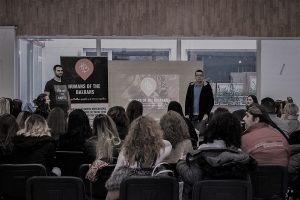Everyone has a story to tell, says Milan Petrovic, a highschool teacher in Nis, Serbia and a co-founder of Humans of the Balkans, an interactive and multilingual web platform for sharing the powerful stories of everyday people in the Balkan region.
Inspired by the famous Humans of New York and motivated by the region’s post-war divisions, Petrovic, a former journalist, set out to collect and share ordinary stories ranging from positive anecdotes to those of heartache and loss.
[Humans of New York creator Brandon Stanton] “saw that New York is a multicultural city, the most multicultural in the world, with many different religions, races, national backgrounds and so on,” says Petrovic. “It struck me because all of these people feel comfortable around each other. The Balkans is also a place with multiculturality but people have a hard history. I wanted to try to make Humans of the Balkans so they can see that they are not so different, that they are more like one another. That’s what we are striving to do with these stories.”
In the process of developing the project, members of the site’s ten-person team traveled to Sarajevo, Podgorica, Tirana, Skopje and elsewhere to collect portraits and stories.

“What is interesting for me is that during these travels we had so much time to speak with these people in Bosnia, Albania, Sarajevo and so on and it struck me that common people don’t have problems with each other,” he says. “Almost everyone has some very positive story to tell, and that’s what drove us all the way to where we are now.”
In addition to the team of street photographers, anyone can register on the site to share a personal story or a story that they are sharing with the permission of someone else.
Each submission follows a model where the correspondent introduces him or herself, saying a few words about who they are and what excites them, in addition to what problems they see in their communities. There is also a list of prompts, like ‘What do you think about your country, your neighboring countries?’ And ‘Do you have any friends on the other side of border?’
“The responses show that people are very motivated and willing to say something,” says Petrovic. “Among our stories, people chose to share how they met their wife, who is from another Balkan country, or how they used to have a very close friend but the war separated them and they never heard from each other again. Some are hopeful they can meet again, and you will also see people that are trying to right some wrongs.”
These themes feed very nicely into the culture of dialogue that is so desperately needed, which Petrovic says he wants to instill in Balkan communities through this platform. Users can upload stories in many of the languages used in the Balkans – Bosnian/Serbian/Croatian, Albanian, Macedonian, and even in English, giving one another access to the stories of people with whom it might not be easy to communicate.
Even when language is not a barrier, the history of the recent war — and a lack of opportunity or will to travel to neighboring countries — can be. For Petrovic, who is 32, this theme is personal. He comes from a so-called “mixed marriage,” with one parent from Serbia and one from Herzegovina. Despite his roots in Bosnia, he had never visited Sarajevo until he went as part of this project.
“I can’t say I didn’t know the place, but after the war you simply don’t go there because you don’t want to spoil the place with negative experiences,” he says of the prevalent worldview. “My whole generation doesn’t want to go across the border. And now my students have inherited this custom of not going there. It is very sad because they don’t even remember what was on TV in those days.”
Once he arrived in Sarajevo to shoot portraits for the project, he came across meaningful, and often warm, experiences, like an interview he did with a woman in a record store who shared her somber story of surviving the siege, but carried her grief so elegantly and bore no malice. Or during a ride with a bitter older taxi driver (“this type exists all across the Balkans,” Petrovic laughs), the moment a barrier of silence—erected when the driver found out Petrovic was from Serbia—was finally broken when the driver, cursing, threw up his hands and said “Who drove us apart in such a way that I feel I have to be silent here?”
Naturally, says Petrovic, “I never asked him to shut up, or something, it is just in your head. A lot of anger came out from him – not at me, or at the Serbian people, but just at the exasperation that it didn’t use to be like this, who made it like this, are we that stupid?” Petrovic says.
His favorite story was the six hours he spent in a Sarajevo tea house the second time he returned, to present the results of the project at the #ResonantBalkans Talks. Those six hours were spent talking with nearly everyone in the tea house, making friends out of perfect strangers.
“We had a whole table of people who had never met each other but they were intoxicated with the story. That is the experience of multiculturality and it shows that the opportunity for dialogue is always there, but we need this culture of the tea house to be revived. We are doing it online, that’s what we are hoping for,” he says.
Now that the site is finally up and running, the biggest priority—and the biggest challenge—is its need to grow into a social media sensation like Humans of New York, whose Facebook page has 18 million likes — more than the population of the Western Balkans!
“We need to stimulate people to go around and figure out how to get as many stories as possible,” says Petrovic of his plans for the future. “If we grow Humans of the Balkans well, it will spread into a mobile journalism network.” He hopes that as people travel, they will use it as a way to meet people and to populate the site with content.
“It’s much easier to motivate them to ask around Sarajevo or some town they’ve never been to. You just approach a random person and get a story,” he says. “And it’s very very magical.”
The Humans of the Balkans project by Nauci Me received seed funding and mentoring support from the Resonant Voices Initiative
